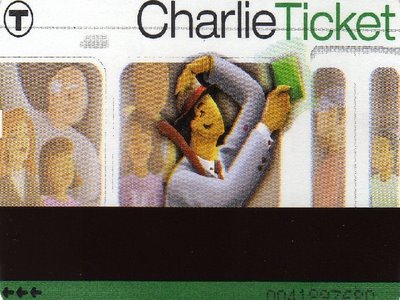The phenomenon of transit authority fare hikes (and commuter protests) is not a new one, of course -- one of the most colorful protest songs ever is "The MTA Song" (made popular in 1959 by the Kingston Trio). It features a hapless Boston-area commuter named Charlie who sets off for the office one day, blissfully unaware of a 5-cent fare hike, and who is not permitted to leave the subway train because he can't cough up the extra five cents to cover the full fare. (Much of the humor, of course, is the lovely absurdity of his predicament. Charlie is able to survive on the train indefinitely because every afternoon, his wife hands Charlie a sandwich through the open window as the train comes rumbling through! I guess if she wanted him back, she could slip a nickel into the sandwich... like a cake with a file in it. He is also sadly unable to find five fellow passengers willing to give him a penny each, or to sell anything he may have with him for a nickel, or... You get the picture.)
So now, in an unexpected fit of honesty, the Boston MTA has switched to its own MetroCard system, which it calls the "Charlie Ticket" (presumably in honor of all of its anticipated fare increases).
But I have to admit that the name, appearance and concept of the Charlie Ticket beat the MetroCard hollow. Chalk one up for the Bostonians.

-------
FN* I have been unable to think up a legitimate reason for the expiration date. If you put, say, $22 dollars on a pay-per-ride card, and misplace the card for an extended period of time, you cannot then take the rides you have already paid for -- even though the transit system has ALREADY taken your money and incurs NO extra cost from allowing you to hop on the train a few years later. (After all, the trains are running anyway!)
And even if there has been a fare increase in the interim, the MTA is not injured by letting you use the card. Suppose you buy a MetroCard with a $18 value at a time when each ride is $2 -- so the MTA puts your $18 in the bank, and you expect to get 9 rides. Then you go off to Tierra del Fuego for a decade, and when you come back, the fare is $18 per ride. If there were no expiration date on your MetroCard, you could at least get your money's worth -- the $18 would only be worth 1 ride now, but at least you could take the ride you've paid for (the MTA has not stolen your $18).
Within a month or so of the expiration date, you can go to the ticket window (if there is one in your station) and request that the dollars be reinstated on your card. It's an annoying extra step, and one that a lot of subway users may not be aware of. But after that little grace period, the MTA makes it even harder -- you have to mail your card in to a central office and REQUEST that they deign to credit you for the money you've already paid them. I am about to try this with two of my old cards from 2004 and 2005 (containing roughly $30).
No comments:
Post a Comment